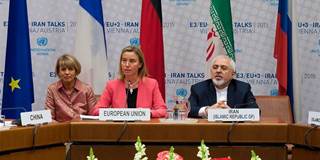There is every reason to believe that the recent agreement to rein in Iran's nuclear capabilities captures and reflects the real interests not just of Iran, but also of the international community. The only thing to lament about is that the deal was not signed and sealed a decade ago, as it could have been.
ROME – The only thing to lament about the agreement reached by Iran and the P5+1 (the UN Security Council’s five permanent members – China, Britain, France, Russia, and the United States – plus Germany) in Vienna this month is that it was not signed and sealed a decade ago. In the years that it has taken for diplomatic sanity to prevail, the Middle East has endured myriad avoidable tensions and lost opportunities for security cooperation.
From 2003 to 2006, Iran made clear to anyone willing to listen that it would agree to all the key elements of the recent deal, including measures to block uranium and plutonium pathways to a bomb and obtrusive monitoring mechanisms to ensure ample advance notice of a likely breakout. All it needed in return – beyond, of course, the lifting of sanctions as implementation proceeded – was formal recognition of its “right to enrich” uranium.
In discussions with the European Union in 2003-2004, Iran voluntarily froze its then-minimal enrichment program, pending negotiation of a full accord. Iran also declared its willingness to apply the “additional protocol,” allowing for much more far-reaching and stringent monitoring by the International Atomic Energy Agency than is called for under standard arrangements.

ROME – The only thing to lament about the agreement reached by Iran and the P5+1 (the UN Security Council’s five permanent members – China, Britain, France, Russia, and the United States – plus Germany) in Vienna this month is that it was not signed and sealed a decade ago. In the years that it has taken for diplomatic sanity to prevail, the Middle East has endured myriad avoidable tensions and lost opportunities for security cooperation.
From 2003 to 2006, Iran made clear to anyone willing to listen that it would agree to all the key elements of the recent deal, including measures to block uranium and plutonium pathways to a bomb and obtrusive monitoring mechanisms to ensure ample advance notice of a likely breakout. All it needed in return – beyond, of course, the lifting of sanctions as implementation proceeded – was formal recognition of its “right to enrich” uranium.
In discussions with the European Union in 2003-2004, Iran voluntarily froze its then-minimal enrichment program, pending negotiation of a full accord. Iran also declared its willingness to apply the “additional protocol,” allowing for much more far-reaching and stringent monitoring by the International Atomic Energy Agency than is called for under standard arrangements.